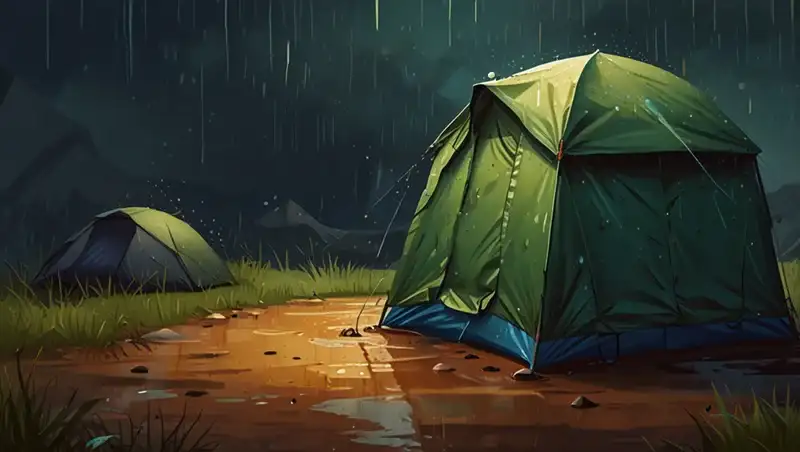If I am in an outdoor situation to choose between ground water and rain water without options to purify them, I would definitely go for the rain water. But this is not without any danger.
When you read about potential hazards of drinking rain water, this is usually related to the home use. This is because of certain ways of collecting the rain water that may lead to contamination. As an example, this may include bird poop that is washed from the roof used to collect the rain water.
So it is more about contamination caused by the way of collecting such water than about the water itself.
But this text is about outdoors and about drinking rain water where you have no other options. So can you drink rain water? If you have no alternatives, you will have to. I am sure that rain water is always much safer than ground water.
If you are forced to drink rain water, it may be better not to start collecting it immediately when the rain starts. So if possible, do it later rather than sooner. This is because there may be more contaminants in the air before the rain, and they may be washed away when it starts raining.

Is rainwater clean before it hits the ground?
According to an article from CDC (Centers for Disease Control and Prevention), there can be bacteria, parasites, viruses, and chemicals in the rain water, and they can make you sick.
I would not argue about such statements, but I am convinced that rainwater is far purer than any groundwater. In any case, it is always best to filter it or purify before drinking, if you can of course.
What chemicals are found in rain water?
In a reliable source, there are some facts about rainwater collected at various locations across the globe. It turns out that rain water contains chemicals that exceed safety levels. This is about synthetic substances called PFAS (per- and polyfluoroalkyl substances).
These are materials used in fire-fighting foam, non-stick pans, water-repellent clothes, etc. So we are exposed to them in daily life and there is no way to escape. In the mentioned source they claim that even in Antarctica and on Tibet, rainwater is unsafe to drink.
In yet another reliable text, I read that these PFAS are found in the blood of people and animals all over the world. They are also present in a variety of food products.
From an article available in The Guardian, it appears that these PFAS are widespread in the rain water throughout USA. They write that in 37 rainwater samples from 30 different sites, each contains at least one of the 36 different compounds being studied.
So from all this you realize that you already have these substances in your body, and drinking rain water when you have to, will not really change anything.
How large is a PFAS particle? Can water filters remove PFAS
This is about molecules, so they are far smaller than any pores of water purifiers. But in a study I find that they can condense into aerosols that are micron sized. This is well within the sizes that can be efficiently removed with backpacking filters and purifiers.
There are brands on Amazon who claim that their backpack-portable water purifiers work on a principle of reverse osmosis, and they can remove PFAS. However, I do not know if you can rely on such statements or not.
How to collect rain water on the trail?
Obviously, this will depend on the situation and on what you have at hand. In the video below you can see how this person collects rain water with a tarp, have a look:
If you are under an overhanging rock and it rains heavily, you will probably have water running from the rock at various places. You can collect it directly, but note that you do not know if the rock above contains bird poop or anything similar. So it is best to boil or filter such a water.
What water filter and purifier to use for rain water?
In my text about glacier meltwater I suggested some reliable options. However, for the chemicals that are expected in the rain water, it is best to use a purifier with activated carbon.
Such tools can remove most of the chemicals in the water. They normally have several filtering stages, and in some of them the mentioned aerosols can be filtered out as well.
One great option is the Katadyn Hiker Pro Transparent Water Filter and something similar you have in the MSR MiniWorks EX Backountry Water Filter.
These are reliable products of the best known brands, and they have been around for years. They will also remove most of possible bacteria that can be present.
Final thoughts
In summary, rain water may not be completely clean but it is usually far better than a ground water. So I would never hesitate to use it. If in addition you also happen to have any sort of filter, do force the water through it, this cannot make any harm.
Check around for more texts of this type in the category FAQs. Read how much water you may need for a two-day hike.
Let me know if you have questions, there is a comment box below.
Subscribe to my weakly newsletter and stay informed, the subscription form is given below. Thank you for reading and have a nice day.
Leave a Reply